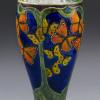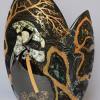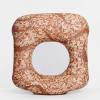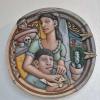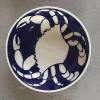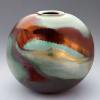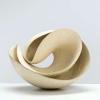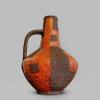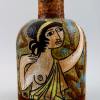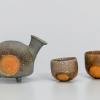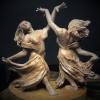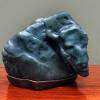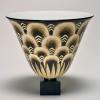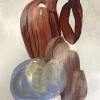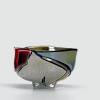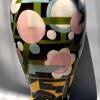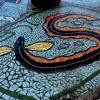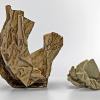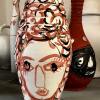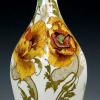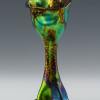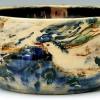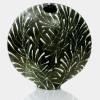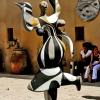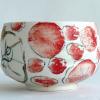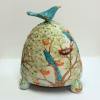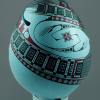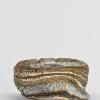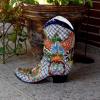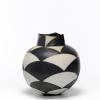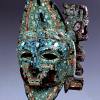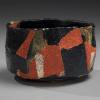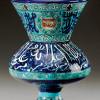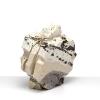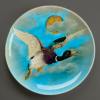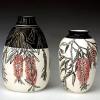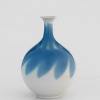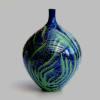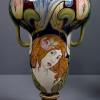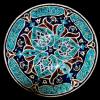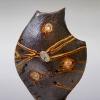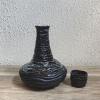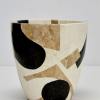
Crackle glazed chalice vessel – Isabelle Petrik
Armagnac Eggnog Goblet
Goblets have a festive look about them, whereas the chalice is more ceremonial in appearance and use, while both conjure the impression of celebration and revelry. The chalice and goblet tend to be large in size and regal in appearance, with the chalice being more ornate and detailed while the goblet is more basic in comparison.
After experiencing the divine nectar of the French Armagnac brandy for the first time recently, which I discovered in preserved figs from France, I decided on a whim to try it for creating an Armagnac Eggnog for the festive season. Its pronunciation rolls off the tongue rather awkwardly, but sounds amusing nonetheless, and I decided to serve it in a goblet, so I am looking at possibilities for an Armagnac Eggnog Goblet. As the Armagnac brandy of Southern France dates back to the fifteenth century and is actually the first wine spirit produced in Europe, I thought its presentation in a goblet would be appropriate.
The goblet name came from the French word ‘gobelet’ around 1300-50 AD, whereas eggnog was derived from from the word ‘nog’, appearing in 1693, which was a wood carved drinking cup. Eggnog is a festive concoction consisting of cream, eggs, sugar and spices mixed with a strong alcoholic beverage or two, created to elevate the spirit. As the chalice can be large enough to function as a compote, I contemplated using one with a more creamy fluid mixture, an Armagnac Le Creme, but settled for a more petite goblet, being appropriate as I didn’t want to start the day with the guests staggering around the garden in a festive stupor. The exotic Armagnac drop has a bit of a kick and cream tends to mask its potency. It also lends itself dramatically to a Crepe Suzzette Flambe.
Downunder, Xmas occurs in the middle of summer, so a ceramic vessel would also keep it chilled longer then a glass one.

Camelot White Goblet
The Armagnaçais of the Amragnac region were distilling brandy two hundred years before cognac was made, the process being brought over from Africa into Southern France by the Moors, who had used distillation for making perfumes. Distinct from Cognac, it undergoes a simplified single distillation process at a lower temperature and is similar to the ancient Georgian wines, the whole vine (stems,leaves and grapes) being used in its production, which delivers more threapeutic qualities to the brandy. Armagnac brandies are the earliest examples of distilled wines known in France and also had the title agua ardente, or fire water.

Justin Lambert wood fired goblet, CO,USA

Spun Pottery Wine Goblet Handmade

‘Lycurgus Cup’ — King Lycurgus entwined in the vine of Ambrosia, a devotee of Dionysus
4th-century Roman glass cage cup made of a dichroic glass, which shows a different colour depending on whether or not light is passing through it: red when lit from behind and green when lit from the front.

Aldo Londi chalice
Italian MCM

Catherine Rehbein ‘Lakeside Sangria’ goblet

Catherine Rehbein goblet

Large ceramic chalice by Pustovit

The Titans Goblet by Thomas Cole

Stoneware goblet, wine chalice

Carol Long ceramic goblets

Ceramic Painted Blue Unicorn Wine Goblet—Wendy’s Ceramics

Ceramic Goblet blue-turquoise–Sharon Miranda Pottery

Bitossi ‘Seta’ Ceramic Compote/Chalice-vessel

Ceramic Wine Glasses from Lee Wolfe Pottery

Egyptian chalice with Pharoh worship decoration in relief

Chalice with paprys motif
Egyptian—ca.1295–1185 B.C

Chalices from Popjoy Pottery–etsy

Chalice shaped ceramic vase by John Bennett with floral design featuring a butterfly.

Chian chalice decorated with a sphinx motif

Ornate-19th Century Medieval Style Bejeweled Goblet/Chalice
1st-dibs

Handmade stoneware goblet by John McCoy Pottery
Etsy

Female faces in releif goblets — Kathleen Raven

Hand Thrown Wine Goblet/Chalice –Brenner Studio Art Pottery

Bold glazed pottery Goblets by Marilee Hall

Autumn Wine Goblet -0- Mangum Pottery

Communion Chalice and Paten — Mangum Pottery

Stephen Benwell — abstract chalice

Govenors Bowl–Peters Pottery

‘Goblet in sage’ – Newman Ceramic Works

Gold Goblet with personifications of Cyprus, Rome, Constantinople, and Alexandria

Terracotta goblet with orime band on lip
Celtic Web Merchant

Vintage Pugi Chalice
1960’s

Andrew Clark ceramic goblet

Porcelain wine goblets finely sculptured in a shape of an old tree trunk with newly grown branches

A R Ceramics—slender wine goblet, UK

Brother Thomas Bezanson (1929-2007) Dark green celadon chalice with kaki and iron oxide glaze,
height 6. 38 in

A-R-Ceramics—wine goblet

Antique Russian or Bohemian Cased Cut Blue Overlay Glass Chalice
Ruby Lane

Beatrice Wood – Luster Glaze Earthenware Chalice Cup with relief figures

Bennett Bean –– ‘Goblets of Fire’

Japanese studio art pottery Ikebana chalic style vessel with color textured salt glaze

Large divided blue/green chalice, used for intinction with wine & grape juice.
Bungalow Studio

California Studio Potter Beatrice Wood, Chalice Form Vase with relief masks

Matt Nafziger ceramic wine goblets

Matt Nolen ‘Chalice’
Gravers Lane Gallery

Matt Nolan chalice – ‘Say you sure are drinking a lot’
porcelain 1996
Judith and Martin Schwartz Collection Photo – John Polak

Matt Nolan chalice – ‘Say you sure are drinking a lot’

Festive Vix Krater – largest Classical Greek bronze vessel found to date, discovered in Burgandy, France,
The massive Vix Krater stands 5ft 4inches tall, weighs 208 kilos and had a capacity of 1,100 litres and was used for mixing wine.
530 – 520 BCE
Museum of Pays Châtillonnais – Trésor de Vix

Russian gold chalice
Hermatige Museum, St Petersburg

Michael Andersen & Son Baptismal Font/Chalice

Michael Cardew – Wenford Bridge Chalice
Height 17cm

Murano glass chalice

Murano Venetian goblet with floral bowl and dolphin stem

Otto Natzler Tall chalice covered in mottled sky blue and amber glaze

Handmade ceramic wine goblet – JessStarkArt

NZ Studio Pottery – Wine Goblet

Peg Tootelian Stoneware Goblet Ceramic Cup

Etruscan servant with large goblet

Peruvian Colonial Chalice–Post Contact

Polia Pillin chalice, footed form
Mid Century

Wine Goblets Set – Salt-Fired Ceramic—Deborah Britt Pottery

Red Lodge Clay Center–George McCauley

The Antioch Chalice — found in Syria 1910
MET NY

University of Southern Denmark researchers revealed that the goblets and plates, which were used by the elite, were glazed using lead, and entered bodies when people ate acidic foods.

Vintage Shorba 1986 Ceramic Pottery Wine Goblets

Andrew Clark

Goblet vessel – TriUshi Ceramics

Zsolnay Chalice – Mihály Kapás Nagy, stoneware, eosyna
Janus Pannonius Múzeum – 1898

Pair of Majolica Palissy Relief Chalices with Grapes

Murano jewel encrusted goblet

Mark Anthony raising a goblet
Le repas de Cléopâtre et de Marc Antoine by Charles Joseph Natoire

Fresco of Theodelinda passing a chalice to her future husband Authari by the brothers Ambrogio
1445

Goblet refill at ‘Psyche’s dinner in the palace of cupid’
Faubourg Saint Germain workshop, circa 1660-Composition–Silk and wool Tapestry from Paris Manufacture

Minnoan Fresco, Knossos Palace
c 1450-1350 BC


